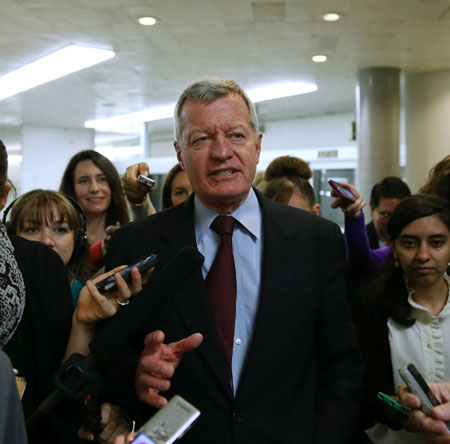当前位置: Language Tips> 双语新闻
Three takeaways from Baucus' selection as Ambassador to China

|
With China increasingly demanding to be seen as an equal to the United States, the White House has selected the next steward of its most important, most complicated bilateral relationship. According to media reports, Max Baucus, the influential Democratic senator from Montana, is set to become the next US ambassador to China. While the implications of Baucus' selection are still unclear, here are three potential consequences of a Baucus ambassadorship: 1. It could enable the White House to take more control of the US-China relationship: In his new role as ambassador, Baucus will replace former Commerce Secretary Gary Locke, who will step down in early 2014 and who was preceded by former Utah Governor and presidential candidate John Huntsman. A respected Democratic voice, Baucus is not necessarily a lower profile pick than his predecessors, and he has already met with Chinese President Xi Jinping several times. Where he does differ, especially from Huntsman, is his near total lack of experience in security issues. "It's an interesting [pick] in the sense that security competition with China is heating up and he doesn't have much of a record" on security issues, said Dan Blumenthal, director of Asian studies at the American Enterprise Institute. While Baucus will certainly get up to speed, he's probably less likely than his predecessors to interfere with the White House and the Pentagon on military or political issues. 2. It could improve Beijing's relationship with Congress: Chinese leaders have always been more comfortable dealing with US presidents -- who have a job that's roughly analogous to their own -- than with members of Congress. "They don't really know what to make of Congress, because it's this cacophony of people with many of them influential on different things," said Patrick Chovanec, chief strategist with Silvercrest Asset Management, who formerly taught economics at Tsinghua University in Beijing. Baucus, who's been in the Senate for 35 years, could help smooth over concerns in Congress about Chinese investment in the United States and unfair trade practices against US companies in China. "Having someone who understands that side of the US government and is influential and has those connections," is probably a good thing for the economic side of the relationship, Chovanec said. 3. It's an uncontroversial and unsexy choice for China: Trade is always an easier bilateral issue for Beijing to deal with than military and security matters or questions of human rights. An October 2010 press release from his Senate office titled "Baucus Presses Top Chinese Officials to Address Trade Concerns, Open Market to Montana Beef" was likely not an issue of concern for Chinese officials. Baucus is a soft-spoken Senate dealmaker who was instrumental in ushering President Obama's signature healthcare overhaul through Congress. An introvert rather than a show man, he is less likely to anger Beijing by building a personal relationship with the Chinese people -- which his predecessors made a point of doing. Photos of Locke flying to Beijing coach class, carrying his own luggage, and waiting in line at a Starbucks went viral in China, because of the contrast they highlighted with corrupt Chinese officials. Huntsman famously rode his motorcycle through the streets of Shanghai and would occasionally ride a bicycle to meetings at the Chinese foreign ministry. Baucus will probably keep a lower profile. The news Wednesday night hit China's Internet as most of the country was waking up -- it's 13 hours ahead -- and Chinese news sites are so far just reporting the story without offering any additional commentary. The small number of Chinese netizens who have commented on the appointment have focused largely on Baucus' age. In China, the unofficial retirement age for top politicians is 70, and none of the members of China's Politburo Standing Committee, the seven-member body that rules the country, is over the age of 68. "How has he not retired at 72?" wondered one user of Sina Weibo, China's Twitter. "Why don't they let him rest?" asked another Weibo user. "What will they do if he keels over?" |
中国日益要求和美国平起平坐,在这个形势下,白宫提名下一任驻华大使以处理最重要、最复杂的双边关系——中美关系。媒体报道称马克斯·鲍卡斯(Max Baucus)将会成为下一任驻华大使。鲍卡斯来自来自蒙大拿州,是一名有影响力的民主党参议员。 虽然提名鲍卡斯出任驻华大使的影响尚未可知,但是下文列出了鲍卡斯接任驻华大使后三个可能的好处。 1. 白宫对中美关系将拥有更多控制权 骆家辉(Gary Locke)接替前犹他州州长、总统候选人乔恩·亨茨曼(John Huntsman,中文名为洪博培)出任驻华大使至今,他将于2014年年初离任,届时鲍卡斯将接替前商务部长骆家辉出任驻华大使。鲍卡斯是一名受人尊敬的民主党要员,和前几任驻华大使相比,他并不是默默无闻,他已经多次会见中国国家主席习近平;鲍卡斯真正不同于前几任驻华大使,尤其是亨茨曼的地方在于,他几乎完全没有处理安全问题的经验。美国企业研究所亚洲研究(Asian studies at the American Enterprise Institute)主管丹·布卢门撒尔(Dan Blumenthal)称“提名鲍卡斯是个有趣的(选择),毕竟中美安全竞赛愈演愈烈,而鲍卡斯在安全问题上并没有什么经验”。虽然鲍卡斯肯定会恶补安全事务,但是他很有可能不会像前几任那样经常干预白宫和五角大楼对军事和政治问题的处理。 2. 北京与美国国会的关系会有所改善 中国领导人和美国总统打交道总是比和国会更自在,因为美国总统的职能和他们的差不多。“中国领导人真的不知道该怎么看待国会,因为国会内部充满分歧,很多人能够影响着不同的事件。”帕特里克·邱伐内克(Patrick Chovanec,中文名为程致宇)说道,他是Silvercrest资产管理集团首席战略官,曾在北京清华大学教经济学。鲍卡斯担任参议院长达35年,他可以减轻国会对中国在美投资和对中国境内针对美国公司的不公平贸易行为的担忧。邱伐内克称“找个了解国会,并且在国会具备影响力、人脉广泛的人当驻华大使”,很有可能促进中美关系经济层面的发展。 3. 中国对此或无争议 相比军事安全、人权问题,北京处理贸易这个双边问题时总是更为得心应手。2012年10月鲍卡斯参议院办公室发布题为《鲍卡斯敦促中国高官处理贸易问题,开放市场接纳蒙大拿州牛肉》的新闻稿,这一事件并未引起中国官员的不安。鲍卡斯善于言辞,一直致力于促进参议院达成协议,奥巴马总统标志性医改措施得以在国会通过,他功不可没。鲍卡斯沉稳内敛,不喜出风头,他如果像前几任驻华大使强调的那样,和中国人民建立亲切关系,北京将会更乐于接受他。骆家辉坐经济舱、手提行李和在星巴克排队照片在中国走红,是因为他和某些腐败的中国官员形成了鲜明的对比。众所周知,洪博培摩托车穿梭于上海的街道,有时还会骑自行车去中国外交部开会。鲍卡斯可能会更低调些。 鲍卡斯或将出任驻华大使的新闻于12月18日,即13小时前出现在中国互联网上,当时中国大部分地区的人刚刚起床,而中国新闻网站到目前为止除了报道这一事件外并未多加评论。那些为数不多评论此事的网民关注的大多是鲍卡斯的年龄。中国高官非官方的退休年龄为70岁,中国共产党中央政治局常务委员会七名常委的年龄都未超过68岁。 “鲍卡斯都72岁了怎么还没退休?”一名新浪微博用户说道。“为什么不让他退休呢?”另一名微博用户问道,“要是他倒下了怎么办?” (译者 uamouse 编辑 丹妮) |
上一篇 : 日本料理入列联合国文化遗产录
下一篇 : 俄罗斯国家杜马通过大赦令 影响2万多人
电话:8610-84883645
传真:8610-84883500
Email: languagetips@chinadaily.com.cn